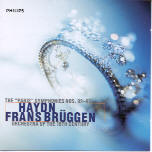Just once I’d like to hear the Paris Symphonies played with the forces Haydn intended: 40 violins, 10 basses, and all the winds doubled. Because they work so well in a “big band” context, I tend to prefer modern instruments and larger ensembles. Bernstein’s set is still the standard by which others are measured, and Karajan’s was one of the surprising successes of his later years. But if you want authentic instruments, then Brüggen’s your man. As anyone who has heard his exceptional set of the 12 London Symphonies already knows, he conducts this music like a Romantic wild man, despite the “period” patina. His loving shaping of movements like the fantastic Capriccio of Symphony No. 86 (his second recording of the work, by the way) could only come from a conductor of the most emotionally expressive variety, yet he still understands that quick movements really need to move, and he handles Haydn’s more humorous moments (the clucking and chuckling of “The Hen” Symphony) like a true comedian. While I still would prefer a beefier overall sound, and both horns and trumpets in the finale of Symphony No. 82 (Brüggen opts for trumpets alone), these performances will provide a great deal of pleasure to anyone in the mood for a Haydnesque good time.
































